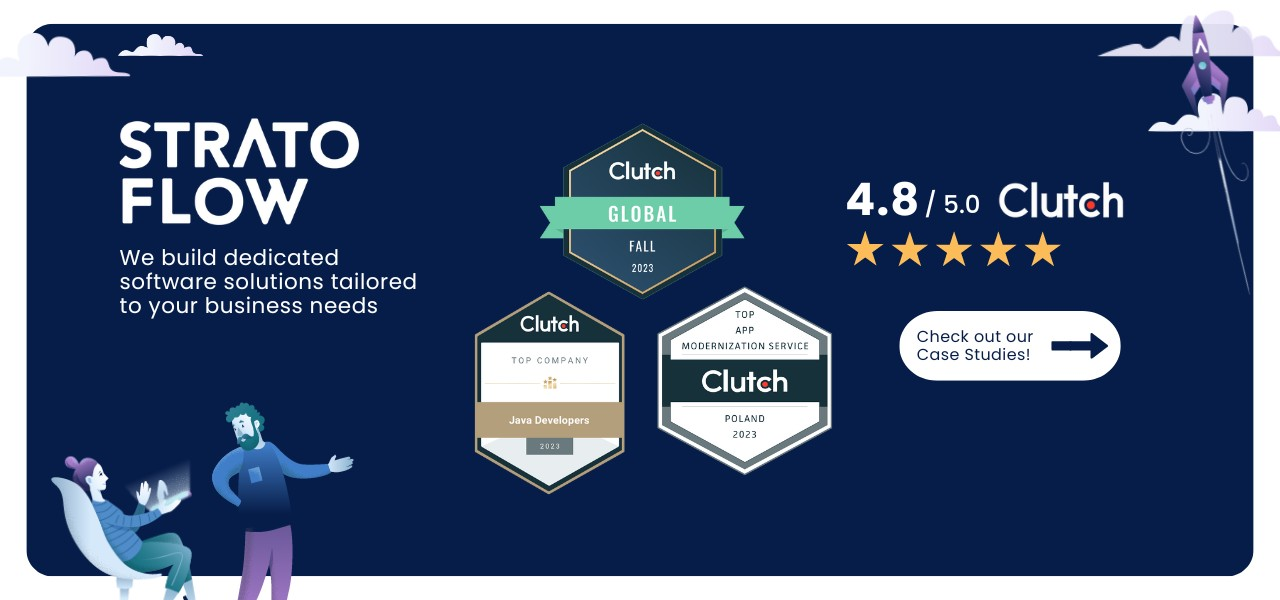
Software Development for Startups: Complete 2025 Guide
The success of tech startups in 2024 will largely depend on how quickly and efficiently they can deliver value to their first customers.
That’s why many startup entrepreneurs are turning to software development outsourcing.
By partnering with experienced custom software development companies, startups can tap into a global talent pool, take advantage of lower rates in different countries, and significantly speed up the development process itself.
Contents
- What Is Software Development Outsourcing
- Startup Software Development: In-house vs Outsource
- How Do I Find a Software Developers For a Startup?
- Why Custom Software Development Is Important For Startups?
- How To Lower The Cost For Startup Software Development?
- Six Rules for Successful Collaboration with Software Development Companies
- Five examples of successful IT outsourcing for startups
What Is Software Development Outsourcing
Software development outsourcing is a strategic approach where startups delegate the creation of their digital products to external development teams or specialized software firms.
This model allows startups to bypass the complexities of building in-house development teams, enabling them to focus on core business strategies while leveraging external expertise.
For resource-constrained startups, outsourcing offers access to global talent pools, cutting-edge technologies, and scalable development processes without the overhead of long-term commitments.
It minimizes recruitment time, reduces operational costs, and accelerates time-to-market—factors that are critical for early-stage companies navigating competitive markets.
Outsourcing also allows startups to scale their operations more flexibly by adjusting the size of their external teams to meet project demands without the long-term commitment of full-time employees.
The pace and effectiveness of software development for startups cvan be deciding factor between success or failure or a success of your idea.
That’s why partnering with a reputable software development company might be a very lucrative strategy for startups looking to make their software product development process as seamless as possible.
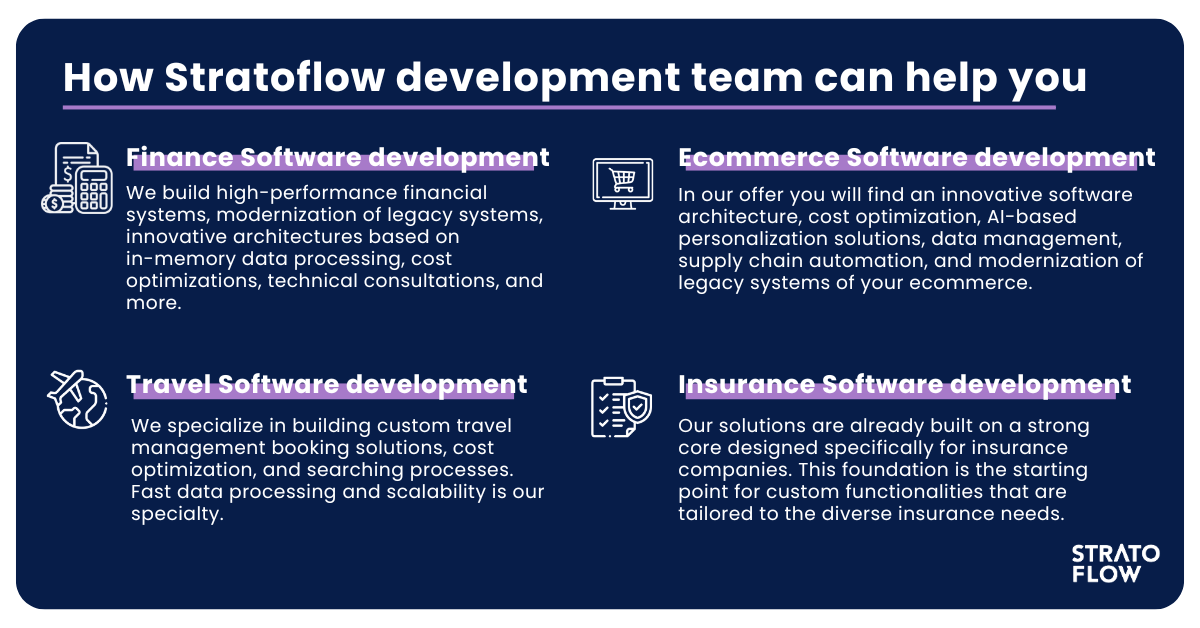
Startup Software Development: In-house vs Outsource
For startup owners, the choice between in-house development and outsourcing depends on critical factors such as time-to-market, access to niche expertise, and budget flexibility.
In-house development provides direct control over the team and fosters deeper alignment with the company’s culture and vision. However, building an internal team can be time-consuming and costly, especially when it comes to finding talent skilled in niche technologies.
On the other hand, outsourcing software development provides immediate access to experienced professionals and specialized skill sets, allowing startups to bypass lengthy hiring cycles.
This approach is especially beneficial for startups that are looking to get to market quickly or are working with technologies such as AI or niche development frameworks.
So what should you do when conceptualizing a brand new digital product?
Working with a software development company can definitely speed up the development process, which is crucial for a fast time to market. If you feel that you lack proper technical expertise and don’t want to be beaten by another company with your idea, an outsourced development team might be a good strategy for you.
How Do I Find a Software Developers For a Startup?
Finding and hiring full-stack software developers for a startup involves several strategic steps to ensure that you partner with the right talent to bring your digital vision to life.
One highly recommended approach is to work with a custom software development company, as these organizations specialize in tailoring software solutions to meet the unique needs of each business.
These companies offer a blend of innovation, expertise, and scalability, making them an ideal choice for startups looking to develop custom software.
To find reputable custom software development companies, startups should consider platforms like Clutch, a business directory that provides detailed information on service providers in the tech industry.
With over 23,000 custom development services listed on Clutch.co alone, making the right choice can be daunting.
That’s why it’s important to know what to look for.
With its collection of client reviews and ratings, Clutch provides and invaluable source of information for startups aiming to assess the reliability, quality, and performance of potential software development partners.
Startups can assess custom software development companies on Clutch by reviewing detailed profiles that include past projects, client reviews, and ratings, which provide insights into each company’s expertise and customer satisfaction.
They should also consider the relevance of a company’s previous work to their project needs, focusing on the firms with strong track records in similar projects or industries.
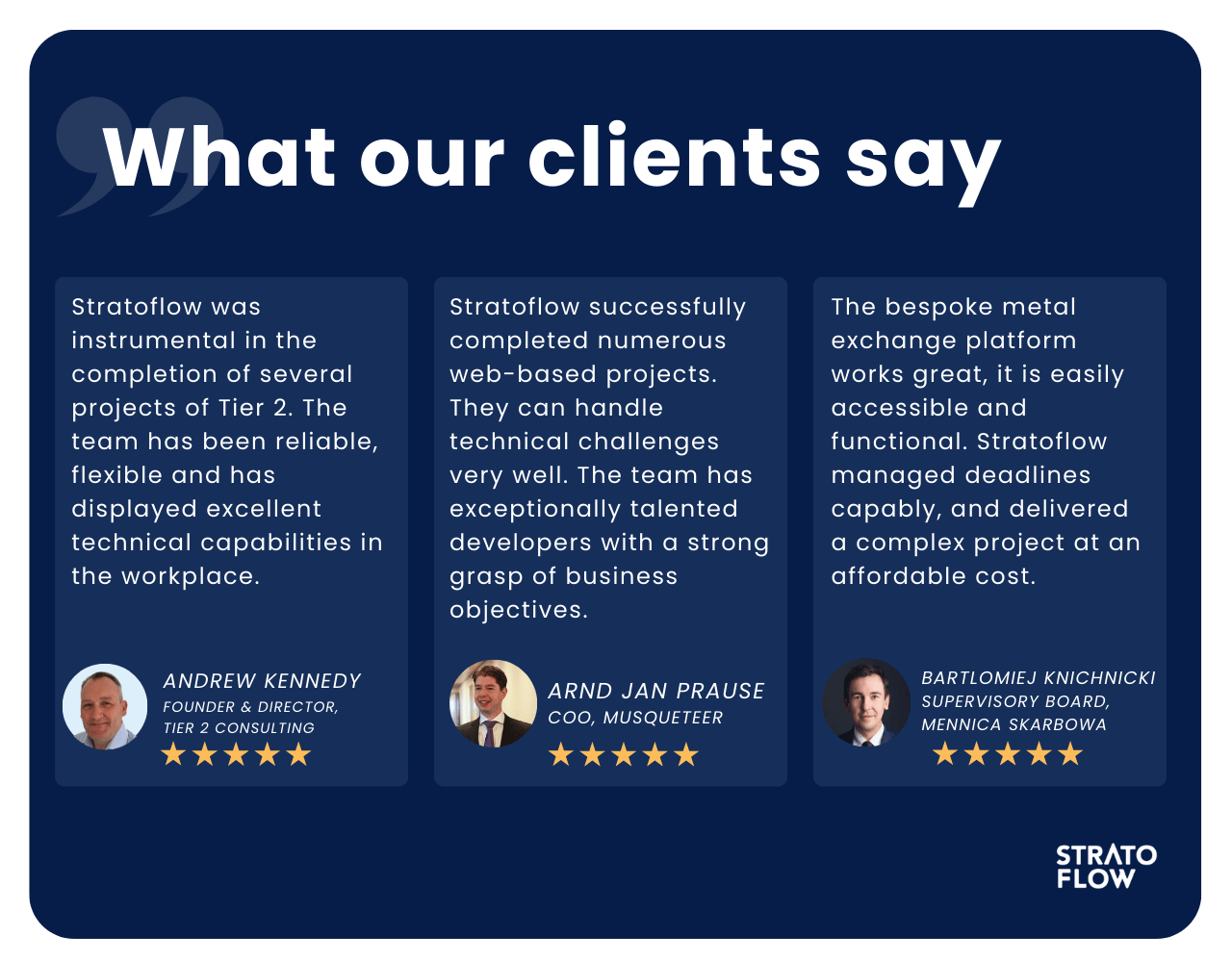
Paying close attention to a company’s average score and reading through client testimonials on Clutch can offer insights into their professionalism, skill level, and ability to deliver projects successfully, helping startups make informed decisions when selecting a software development partner.
[Read also: How to Choose a Software Development Company in 2024 [CHECKLIST]]
Why Custom Software Development Is Important For Startups?
Outsourcing a software development project is a strategic move that can significantly advance a startup’s growth trajectory and market position.
Here are five key benefits of outsourcing software development that underscore the value of this approach for startups looking to innovate and scale efficiently.
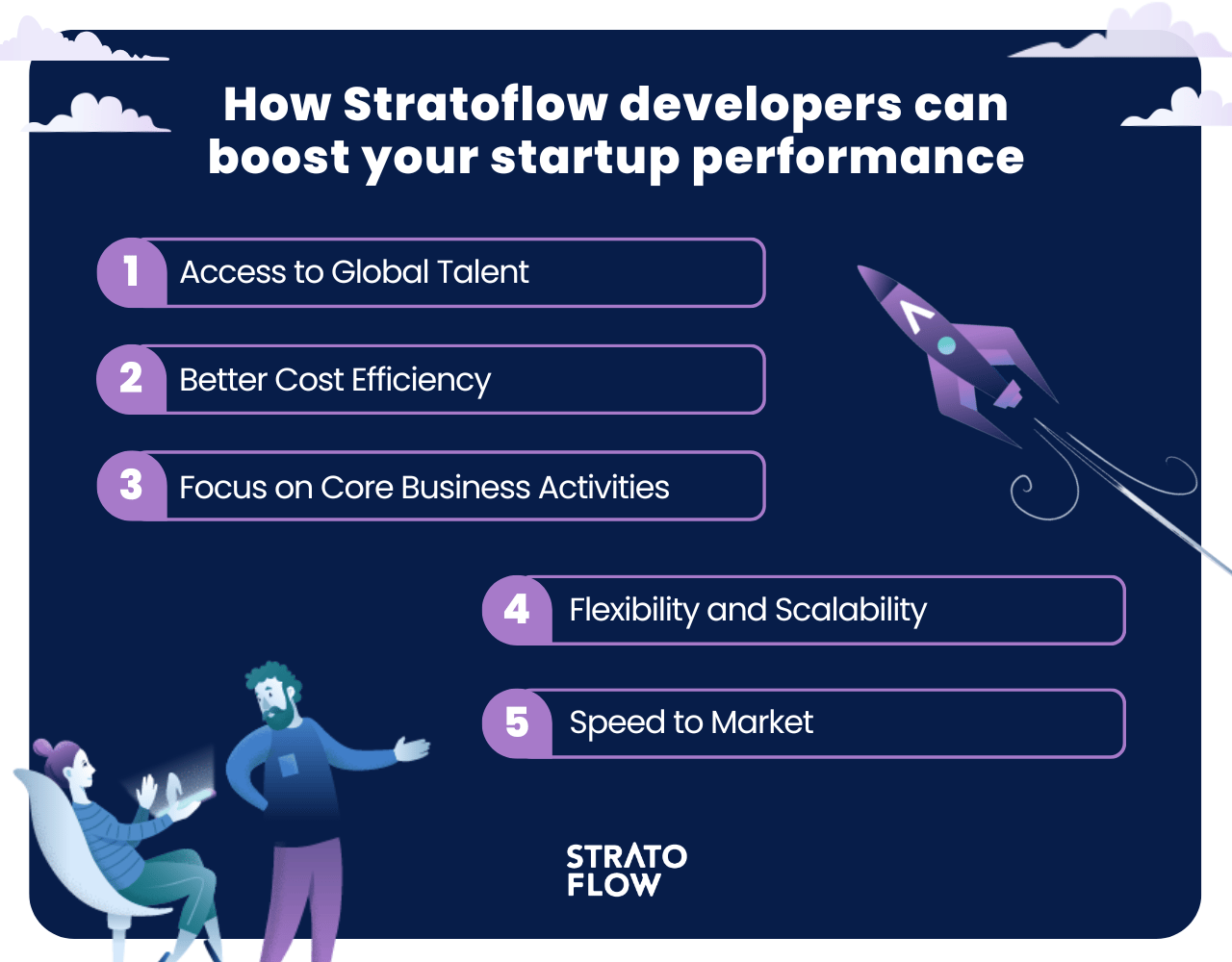
Access to Global Talent
Outsourcing opens up a world of possibilities for startups to work with highly skilled professionals from around the globe.
This means startups can find software developers in specific technologies or industries, build a development team enhancing the quality and innovation of their software solutions.
Cost Efficiency
By working with an experienced software development agency, startups avoid the substantial costs associated with building and maintaining an in-house team of software developers.
This includes savings on salaries, benefits, and office space, making it a financially smart choice for startups looking to optimize their budgets.
Focus on Core Business Activities
Outsourcing the development process allows startup founders and their teams to concentrate on their primary business objectives, such as refining their product market fit, customer acquisition, and other strategic areas critical to their growth and success.
Flexibility and Scalability
The nature of outsourcing provides startups with the ability to quickly scale their development efforts up or down based on current needs and market conditions. This agility is crucial for startups that need to adapt rapidly to competitive challenges or opportunities.
Speed to Market
With the support of an experienced software development partner, startups can accelerate their development timelines.
Outsourcing can lead to faster turnaround times for bringing products to market, giving startups a competitive advantage by meeting customer needs more quickly and efficiently.
[Read also: Outsourcing vs. Insourcing: An In-Depth Comparison to Guide Your Business Strategy]
Stratoflow: Startup Software Development Company
At Stratoflow, we take pride in delivering high-performance, custom software solutions designed to meet the unique needs of clients across diverse industries, including fintech, real estate, travel, e-commerce, and insurance.
Our custom software development approach focuses on understanding clients’ priorities to create efficient, scalable systems that act as strategic assets.
With a robust technology stack—including mobile-friendly web applications, scalable in-memory processing, lightweight Java development, and reliable databases—we’re equipped to handle complex challenges.
We partner throughout the software development process, from requirement analysis, development and testing to system migration, installation and maintenance.
Stratoflow developers specialize in custom solutions that provide customization, flexibility, and a competitive advantage by ensuring that our software can grow and adapt with our clients’ businesses.
Contact us today to explore how we can bring your ideas to life!
How To Lower The Cost For Startup Software Development?
In the startup scene, especially in 2024, cost and time efficiency in software development are critical factors.
Startups are in a constant race against time and budget constraints to develop and deploy their products.
If you are looking for ways to deliver digital products to the market quicker and save both time and money take a look at Openkoda: platform for rapid software development.

As an open-source platform, Openkoda accelerates the development of business applications and internal tools by leveraging pre-built templates and customizable solutions.
This reduces development time and costs, with Openkoda enabling application development up to 60% faster than traditional methods.
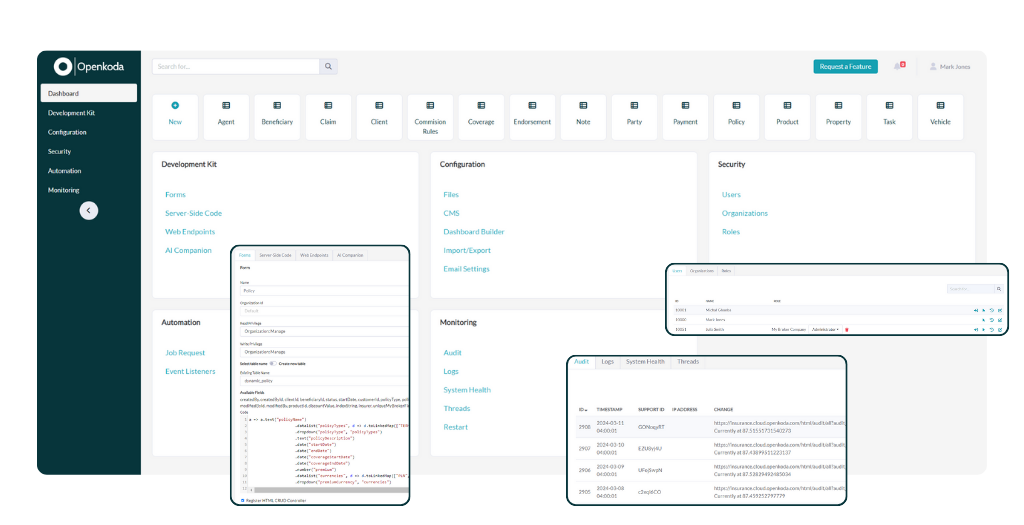
The platform is built on a foundation that encourages rapid application development.
By using technology stacks that developers are familiar with, such as Java, Spring Boot, JavaScript, and PostgreSQL, Openkoda ensures that teams can get up to speed quickly without having to learn new languages or frameworks.
It provides a comprehensive set of out-of-the-box features, including dynamic entities, application admin panels, user and organization management, event listeners, and multiple multi-tenancy models.
This rich feature set enables the rapid assembly of complex applications while maintaining the flexibility to customize and extend as needed.
In addition, Openkoda supports rapid minimum viable product (MVP) development.
The ability to launch an MVP in significantly less time than traditional development methods can dramatically reduce time to market and initial development costs.
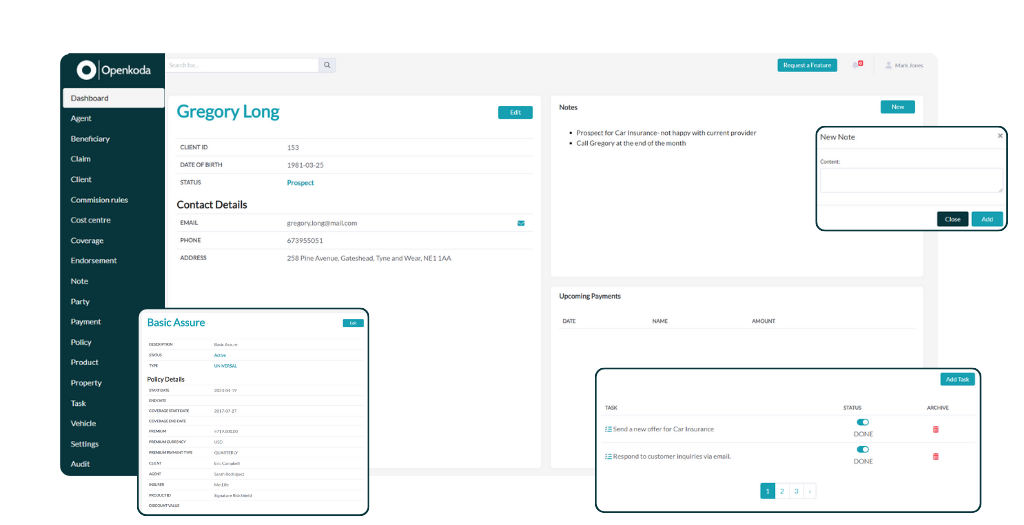
Openkoda is a compelling solution for startups looking to efficiently overcome the challenges of software development.
Do you think that Openkoda can boost your startup?
Six Rules for Successful Collaboration with Software Development Companies
Before a startup begins outsourcing its software development, it’s critical to thoroughly evaluate several important factors.
Here are six key rules that you need to follow to make sure that your startup project goes according to the plan:
Rule #1: Define the Scope of Your Project
Before choosing your go-to development team start by clearly articulating the project’s scope involves outlining specific goals, features, and functionalities you wish to achieve with your software solution.
A well-defined scope helps potential development partners understand your vision and requirements, leading to more accurate proposals and ensuring alignment with your objectives.
Rule #2: Establish a Realistic Budget
Then move on to determining your budget upfront is critical for guiding your choice of software development company.
It helps to filter out potential partners who can deliver within your financial constraints while still maintaining the desired quality.
Being transparent about your budget also facilitates open discussions about what is achievable, allowing for adjustments to the project scope or timeline if necessary.
Rule #3: Set a Realistic Timeline
Establishing a timeline that reflects the complexity of your project and market demands is essential for cooperation with software outsourcing companies.
Communicate your expected milestones and product launch dates to ensure the software development company can meet your scheduling needs.
A realistic timeline also accounts for potential challenges or delays, providing a buffer to address unforeseen issues.
Rule #4: Communication and Collaboration Approach
Effective communication is the backbone of any successful project.
Evaluate the company’s communication tools, processes, and their willingness to integrate with your team.
Regular updates, responsiveness, and open lines of communication are vital for addressing issues promptly and ensuring your project remains on track.
Rule #5: Project Management and Methodology
Familiarize yourself with the company’s approach to project management.
Do they follow the principles of agile software development methodology?
Do they hold regular meetings with project stakeholders?
Do they work in short development sprints?
These things are crucial to check before signing the contract.
Rule #6: Remember About Due Diligence
At last, beyond evaluating technical capabilities, conduct thorough due diligence on potential partners.
This includes verifying their legal status, financial health, and reputation in the industry.
Due diligence ensures you are entrusting your project to a reliable and solvent company.
[Read also: How to Find App Developers Near Me in 2025? Comprehensive Guide]
Five examples of successful IT outsourcing for startups
Can outsourced software development for startups really work?
Can a team, often on the other side of the world, deliver high quality software that meets your initial vision?
Of course it can!
Many successful companies have used software development outsourcing, turning to skilled professionals outside of their immediate team to speed up the process.
Here are six notable examples of startups that have successfully used software development outsourcing to build their products and scale their operations:
Example 1: Opera

Opera, a renowned web browser, used software developers from several nations to develop and deploy specialized software for its online platform.
Understanding the importance of diverse perspectives and skills, the company used outsourcing to access a global pool of talent.
This strategy enabled them to build a strong and inventive web platform that stood out in the fiercely competitive browser industry.
Example 2: Skype

Skype benefited greatly from outsourcing, working with Estonian developers who built the entire backend of the application.
This collaboration was fundamental in enabling Skype to pioneer video calling and later be acquired by Microsoft for $8.5 billion.
Example 3: Basecamp

Originally a side project of a web consulting agency, the project management software was driven through strategic outsourcing.
This allowed for rapid refinement and scaling, ultimately allowing the founders to focus on Basecamp full-time and build a remote development team that supports customers worldwide.
Example 4: Alibaba

In its early days, outsourced its website development to a firm in the United States due to a lack of local talent and to overcome internet restrictions in China.
This move was critical for Alibaba to become a global e-commerce giant.
Example 5: Slack

Slack hired a custom software development company to overhaul its website and app.
This helped Slack refine its product and significantly contributed to its popularity as a collaboration tool, leading to its current valuation of $27 billion.
Their story is a powerful example of how startups can leverage outsourcing to accelerate growth.
Frequently Asked Questions (FAQ)
Why is software outsourcing a strategic choice for startups?
Outsourcing software development is a strategic choice for startups looking to efficiently navigate the competitive and fast-paced technology landscape.
By outsourcing, startups can prioritize core business strategies, market research, and customer engagement while delegating technical complexities to trusted partners.
This approach supports rapid scaling and adaptation to evolving market demands, offering flexibility without the costs and delays of hiring or downsizing internal staff.
What are the average outsourcing software development cost?
The average cost of software development can vary widely based on several factors, including the complexity of the project, the geographic location of the development team, and the level of expertise required.
In general, regions such as Eastern Europe and Poland offer more cost-effective rates ranging from $25 to $50 per hour for software development services. In contrast, outsourcing to companies in North America and Western Europe can be significantly more expensive, with hourly rates often ranging from $75 to $150 or more.
Here are examples of various projects and their estimated costs:
Small Projects
- Number of Developers: Typically requires 1-3 developers.
- Budget Required: Budgets can vary widely but often fall in the range of $5,000 to $20,000.
Medium Projects
- Number of Developers: Usually requires a team of 3-5 dedicated developers, potentially including a project manager and a QA specialist.
- Budget Required: The budget for medium projects typically ranges from $20,000 to $100,000.
Large Enterprise Projects
- Number of Developers: Often requires a large team of 5-10 developers or more, along with dedicated project managers, QA specialists, and UX/UI designers.
- Budget Required: Budgets for large enterprise projects usually start at $100,000 and can go up to several million dollars.
What are the models for outsourcing software development?
Outsourcing software development can be structured around several models, each with its own unique approach to collaboration, project management, and financial arrangements.
Here are the main models for outsourcing offshore software development:
- Fixed Price Model – Suitable for startups that want to develop software with clearly defined scopes and requirements. Ensures budget certainty but demands detailed specifications upfront. Changes may incur additional costs.
- Time and Materials (T&M) Model – Flexible billing based on actual time and resources used. Ideal for evolving requirements or projects without fixed scopes.
- Dedicated Team Model – Provides a full-time, outsourced team integrated with the startup’s processes. Best for long-term projects or scaling development capabilities.
- Staff Augmentation Model – Extends in-house teams by adding outsourced talent to address skill gaps or workload peaks. Retains project control while leveraging external expertise.
- Project-Based Model – Delegates entire projects, from conception to delivery, to an outsourcing partner. Suitable for startups seeking end-to-end development with minimal internal oversight.
Each of these models has its advantages and considerations, so it is important for startups to carefully evaluate their project needs, management capacity, and financial flexibility before choosing the model that best fits their outsourcing strategy.
How to choose the best software development outsourcing company?
If you are a startup owner and want to outsource software development, choosing the best software development outsourcing company is a critical decision that can significantly impact the success of your startup’s project.
Here’s a structured seven-step approach to making an informed choice:
- Step 1: Define Requirements – Outline project scope, goals, and technical needs to assess whether potential partners have the required expertise.
- Step 2: Research and Shortlist – Identify companies with relevant experience, strong portfolios, and positive client reviews that align with your project needs.
- Step 3: Evaluate Expertise – Assess technical skills, technology proficiency, and track record in delivering similar projects.
- Step 4: Assess Cultural Fit – Ensure alignment in work ethics, communication styles, and problem-solving approaches for seamless collaboration.
- Step 5: Analyze Costs – Review pricing models and ensure transparency to avoid hidden fees while staying within budget.
- Step 6: Verify References – Contact past clients to evaluate reliability, quality of work, and adherence to timelines and budgets.
- Step 7: Test with a Pilot – Start with a trial project or pilot phase to validate capabilities and compatibility before full-scale engagement.
Related Posts
Thank you for taking the time to read our blog post!
